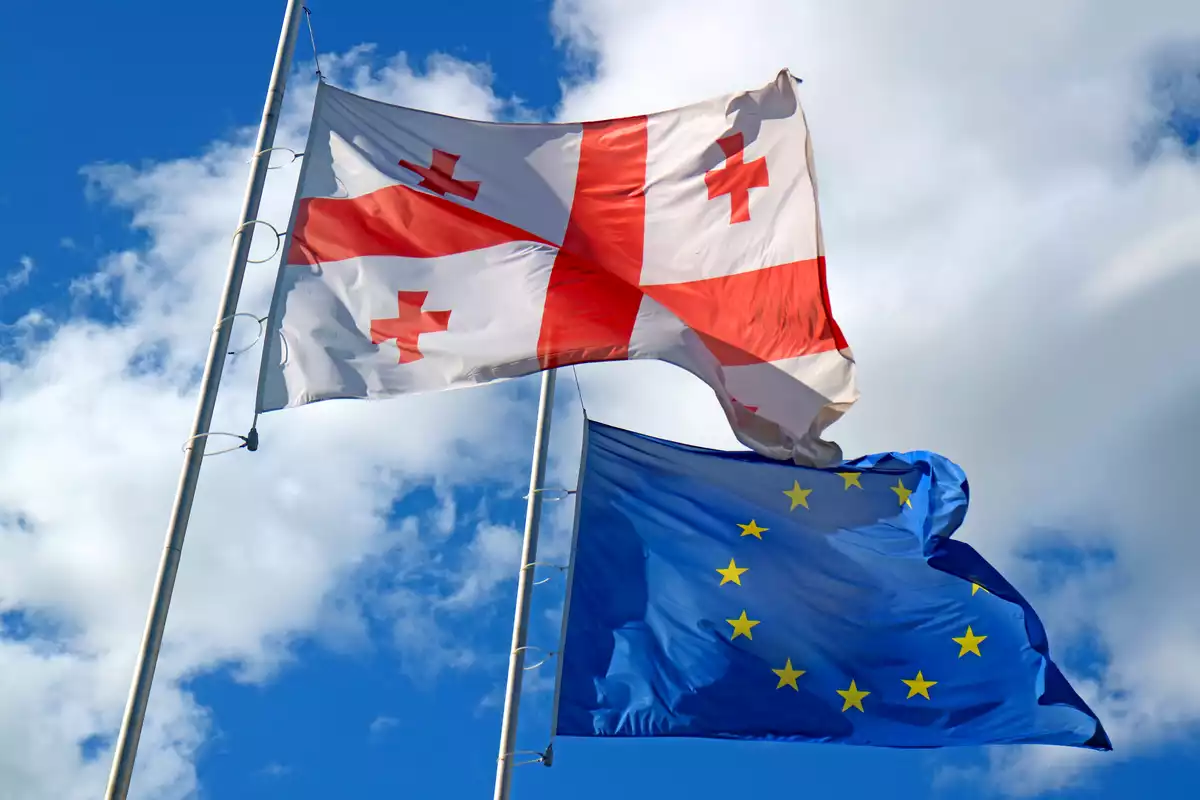
Photo credit: emerging-europe.com
Senior officials from Georgia’s ruling Georgian Dream party have issued a series of statements minimizing the importance of visa-free travel with the EU-a move critics argue is intended to prepare the public for its possible suspension by the EU.
This came soon after an interview by Georgian news site BM.ge with German Ambassador Peter Fischer, in which he spoke about the deterioration of relations between Georgia and the EU, The Caspian Post reports citing foreign media.
Fischer insisted that ‘no one wants to punish the Georgian people’, but emphasised that visa-free travel was a ‘great privilege’.
‘Visa-free regime is for very like-minded countries that are free democracies, where human rights are respected, or we don’t have a migration problem. So we have to look is that condition still true or not. That’s the process we’re in’, he added.
‘We love for Georgian people to come[...] but if a country changes its foundation, and if there is a migration issue, that is a burden for us, then we have to reassess. It’s normal’, Fischer
Georgia’s dramatic democratic backsliding since 2022 has led to frequent discussions within the EU and member states over whether to suspend the bloc’s visa-free regime with Georgia. Officials from several member states have expressed support for the measure, while others have pushed back, arguing that to do so would punish the Georgian people, who strongly support the country’s EU integration.
The first response to Fischer’s interview came from the Speaker of the Georgian Parliament, Shalva Papuashvili, who said in an interview with pro-government TV channel Imedi that he did not expect the visa-free regime to be revoked while claiming that ‘it is a tool for political pressure and blackmail’.
‘It seems that today, part of Brussels’ bureaucracy wants to have leverage to influence other countries’, he said.
Papuashvili also said Fischer often displayed ‘a bit of arrogance’, before going on to downplay the importance of visa-free travel to Georgians.
‘Is visa-free travel some kind of divine manna?’, he asked. ‘We also give visa-free access to Germans - so what?! Sorry to everyone, but visa-free travel means a Georgian tourist goes to Germany or France, spends money there, and contributes to their economy’, he said, claiming that it would be the EU economy that would suffer ‘if they close the visas and don’t let the tourists in’.
Papuașhvili’s comment was soon followed by a response from Sozar Subari, an MP from the Georgian Dream satellite party People’s Power. Subari framed the visa-free travel issue within the context of the ruling party’s frequently promoted conspiracy narrative about the ‘deep state’ or ‘global war party’.
‘I truly don’t have such a low opinion of the Georgian people as to think that visa liberalisation is more important to them than rejecting the anti-national and anti-Christian policies that the “deep state” is trying to impose on us ’, he wrote on social media.
Joining her colleagues, Georgian Dream MP Nino Tsilosani added that ‘visa-free travel is certainly comfortable’, but ‘if comfort conflicts with patriotism, the Georgian people have always and will always remain patriots of their country’.
She also noted that ‘this comfort was earned during the rule of Georgian Dream’ and that it ‘was not given for nothing’.
These statements were responded to by opposition politicians, with the leader of the Lelo party, Mamuka Khazaradze, noting that visa-free travel was ‘the achievement of the Georgian people, not the [Georgian] Dream [party]’.
‘We will fight and protect this achievement to the end!’, he wrote on Facebook.
The ruling party’s rhetoric was also criticised by Mikheil Janelidze, who was Foreign Minister in 2015-2018 under Georgian Dream and is now a critic of the ruling party.
He said the ruling party was spreading the message that ‘a Georgian man’s patriotism will not be exchanged for visa-free travel with the European Union’.
Janelidze said visa-free travel with the EU had allowed ‘families separated for years due to illegal migration’ to be reunited and ‘tens of thousands of people were able to receive life-saving medical assistance’ in EU countries. He also noted that ‘tens of thousands benefited from legal temporary migration and employment’.
The discussion in Georgia around visa-free travel, which was granted to Georgia in 2017, comes amid work in the EU on a draft regulation changing the grounds that are needed to suspend visa-free travel for third countries.
The EU Council said in March that the EU Committee of Permanent Representatives had agreed their position on a draft regulation.
‘This new law, when adopted, will boost the EU’s toolbox to counter situations when visa-free travel is being abused or works against the interests of the EU’, the EU Council’s press release read.
The new grounds to suspend visa-free travel included a lack of alignment of a third country with the EU’s visa policy, the operation of an ‘investor citizenship scheme’, or ‘hybrid threats and deficiencies in document security legislation or procedures’.
‘Member states have decided to also include the possibility to suspend the visa-free regime in case of a significant and abrupt deterioration in the EU’s external relations with a third country, in particular when it relates to human rights and fundamental freedoms’, the press release said.
Georgia’s relations with the EU and its member states have sharply deteriorated since early 2022, following the ruling party’s adoption of several pieces of repressive legislation, as well as the widespread violations that were documented during October 2024’s parliamentary elections. Relations plummeted further still after the Georgian government announced it was freezing it’s EU membership bid, violently dispersing protesters against the decision.
Prior to the elections, the EU suspended over €120 million ($140,000) in aid to Georgia.
At the end of January, the EU also suspended the visa-free regime for Georgian diplomatic passports, while member states have imposed individual sanctions on a number of Georgian officials and halted several cooperation projects.
Share on social media